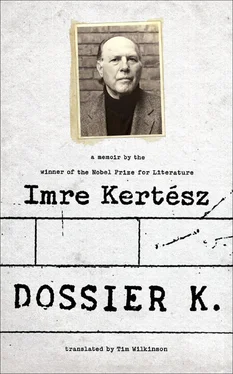Because in Berg’s view, man has become superfluous in a dictatorship. The only way he can find the grace is by what he refers to as “service,” “serving the order.”
In the form of either villain or victim … If we did not have the written records that were left behind by the various dictatorships, I would venture to say that we would have no idea what this man was talking about. Even as things are, his figure is fairly shrouded in mist. Who exactly is he?
I suppose that in Berg’s figure I was constructing an imaginary representation of the “Old Boy” whom one gets to know in the frame novel. He’s a man of absolute theory, who is pondering “a plan for a dissertation, on a not-too-ambitious scale, concerning the possibilities for an aesthetic mediation of violence.”
In other words, the figure of the “Old Boy” is replicated, as it were, in the Köves novel?
Precisely — rather like a cinema film shot through a prismatic lens. The scenes with Köves and Berg, followed by Köves’s epistolary confession, are the culmination of the novel, the place where the entire burden of argument is brought to a terse climactic point around them.
One in which Berg goes mad, whereas Köves carries on and then suddenly finds himself in the L-shaped corridor … which is where he is overtaken by a moment of rapture .
Of enlightenment.
My apologies for the loose language. In any event it is a matter of a mystical moment, an experience that one cannot recount in the language of rationality but which, one could say, abruptly changes one’s life. What in fact did happen to you in the corridor?
I have already said this several times, and I fear that I shall be guilty of repeating myself. Or rather I fear that I won’t be able to put it like … like for example …
Like you put it in Stockholm .
Stockholm is several light years away from the place where we are holding this conversation. And it may well be that our path does not lead to Stockholm, anyway.
What do you mean by that?
That we have yielded to this flawed logic several times already. We are sitting here at total ease and safety at the endpoint of our story and contentedly chomping away about the splendid triumphal procession. We are divesting ourselves of any risk, because every step we take is another step toward the goal, and we can have complete confidence in each and every step: everything we do is correct, because we are progressing towards our goal. That is why we boarded the train that chuffed toward Auschwitz; that is why I was not shoved to the left by the doctor at the Birkenau selection; that is why kindly hands hauled me out from among the corpses at Buchenwald, and so on … in that way the story would come to pass, except it would not be a Job’s story of making atonement, as you might suppose, but of a vulgar kitsch, the career of a ridiculous buffoon. Every individual story is kitsch, because it evades the rules; every single survivor attests purely to a breakdown in the machinery that has occurred in an individual case. Truth belongs only to the dead, no one else.
But the dead keep their counsel … the truth belongs to those who speak out. You yourself said that; I read it somewhere in Galley Boat-Log. 16 Let me put rather the following question: What was the immediate outcome, or consequence if you prefer, of the enlightenment you underwent in the L-shaped corridor?
That for weeks or months on end, or however long it was, I wrote and wrote a text that drove me to despair every day, because in no way would it assume any shape, coalesce into an organic whole. It bubbled out from somewhere deep inside me like scalding-hot lava and then spread out amorphously, destroying everything around.
That sounds pretty alarming — rather as though you were recounting being possessed by a deleterious passion .
Precisely. Every day I would write something that, when I read it over at the end of the day, I would find dispiriting. The next day, despite my ever-growing sense of dismay, I would nevertheless start all over again …
What caused that “ever-growing sense of dismay” ?
The fact that I had to give way to the demands of the text. I had to recognize that the sentences that would appear under my hand would sometimes arrive unexpectedly: they knew more than I myself did; they would surprise me with secrets that I was unaware of; they would not tolerate my interventions but lived some sort of autonomous, alien life that it was up to me to understand rather than dominate … slowly the threatening thought dawned on me that I needed time, more time, in fact a great deal more time …
In order to prepare for your career?
The word “career” is totally out of place here. My so-called career is at best the product of a construct in hindsight — that’s if anyone should seek to slip in the fallacy of logic into processes that are otherwise spontaneous and inexplicable. Forget the career and try instead to imagine a completely bewildered young man who, not knowing why, started to write, sharpened pencils, and spread sheets of blank paper in front of himself while noting with horror that there was nothing to justify his actions — indeed, what he was doing was frankly nonsensical.
Despite that, every day you carried on with your apparently senseless experiments. Why?
Out of an existential angst that may have silenced everything else inside me.
Existential angst … could you label that any other way?
A compulsive psychosis … categorical inner imperative … the fulfilment of a task … how should I know?
Not a bad task. Did a sense of vocation awaken in you, perhaps?
No way! I have many faults, but I never felt a sense of vocation.
Maybe that was the way in which your talent manifested itself .
Yes, talent is one of those words that is used, but no one knows what it means.
“In the end it may yet transpire that I do, indeed, have some talent for writing, which would make me truly sorry,” writes the Old Boy in Fiasco, “since I did not start writing because I have talent; on the contrary, when I decided that I would write a novel, evidently I also decided, by the bye, that I would become talented. I needed it; there was a job to be done. I had to aim to write a good book, not out of vanity but in the nature of the thing, so to say.”
Well, yes, but at that point in time, at rock bottom, I couldn’t have known that I was going to be so wise thirty years later.
If you didn’t realize it, you have still not answered my earlier question as to what, in fact, happened to you in the L-shaped corridor .
Let’s just accept that not every question has an answer.
“There comes a moment in the lives of men when they suddenly become aware of themselves and their powers are freed; from this moment onward we can reckon to be ourselves, this is the moment when we were born,” you write in Galley Boat-Log. 17
One can hardly go further than that. I recollect an ecstatic moment that I could only capture here and now with rather vacuous words.
All the same, that was the moment that determined the further course of your life .
That is undeniable.
Which forced you to the writing desk, which held you prisoner among your papers — is that what you call “existential angst”? What sort of text was it that you were in fact struggling with? Was it a novel, a short story, a diary, memoir?
Let me put it this way: a longish short story.
One that, as you said, refused to assume any shape. What happened to it in the end? Did you discard it?
Fortunately, no. The better passages from it found their way, thirty years later, into the novel-in-the-novel of Fiasco .
Читать дальше












